Liability of Medical Institutions
VerifiedAdded on 2020/10/05
|6
|1509
|469
AI Summary
The assignment discusses a case where Mr. Pettigrove, a mentally ill individual, caused harm to himself and others after being released from a hospital. The tribunal found that the hospital and its staff members were not liable for the incident as they had followed proper procedures and did not know of any illegal activity. The court's decision emphasized the importance of least restrictive care for individuals with mental health issues. The assignment refers to several legal cases and studies, including Smith v Pennington and Ryan et al.'s discussion on the importance of least restrictive care.
Contribute Materials
Your contribution can guide someone’s learning journey. Share your
documents today.
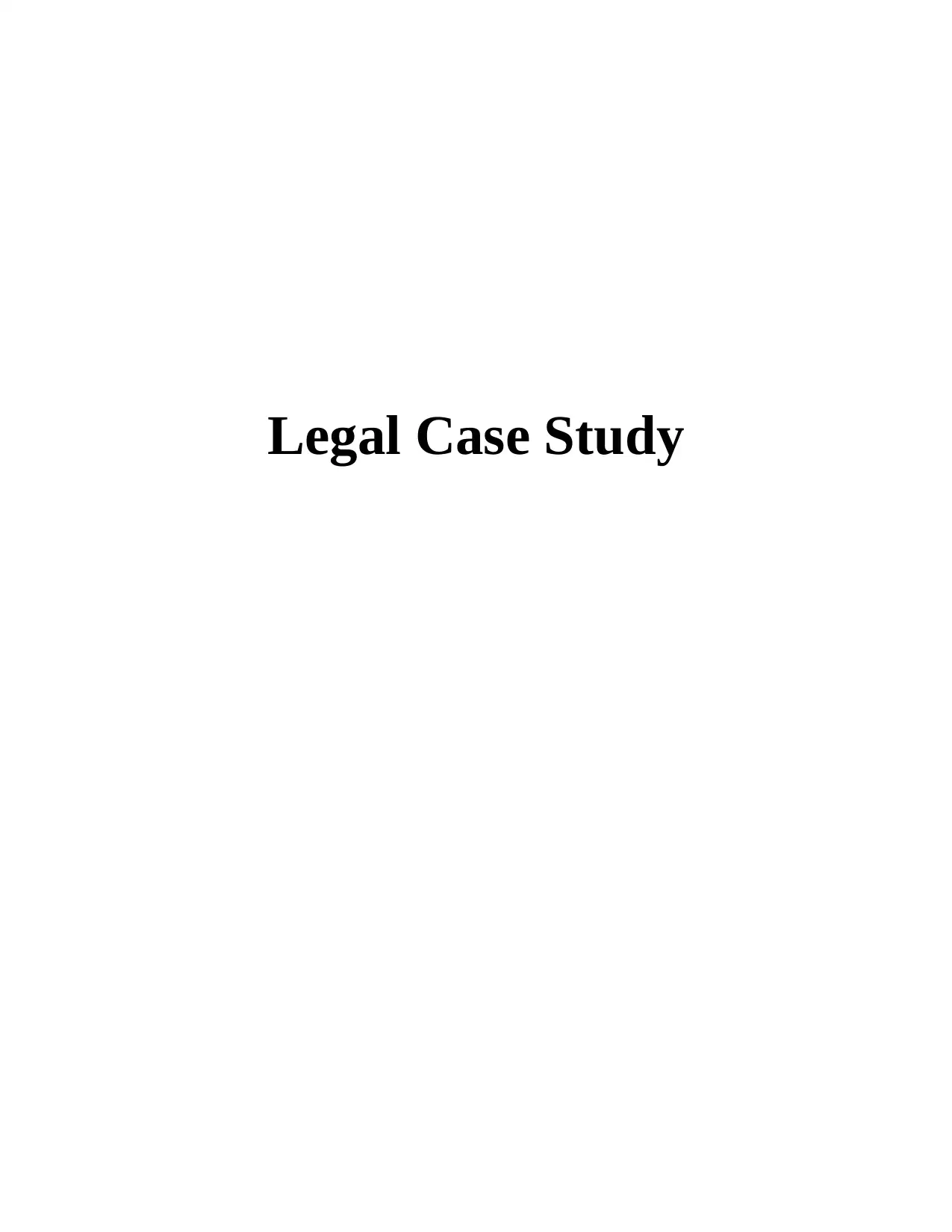
Legal Case Study
Secure Best Marks with AI Grader
Need help grading? Try our AI Grader for instant feedback on your assignments.
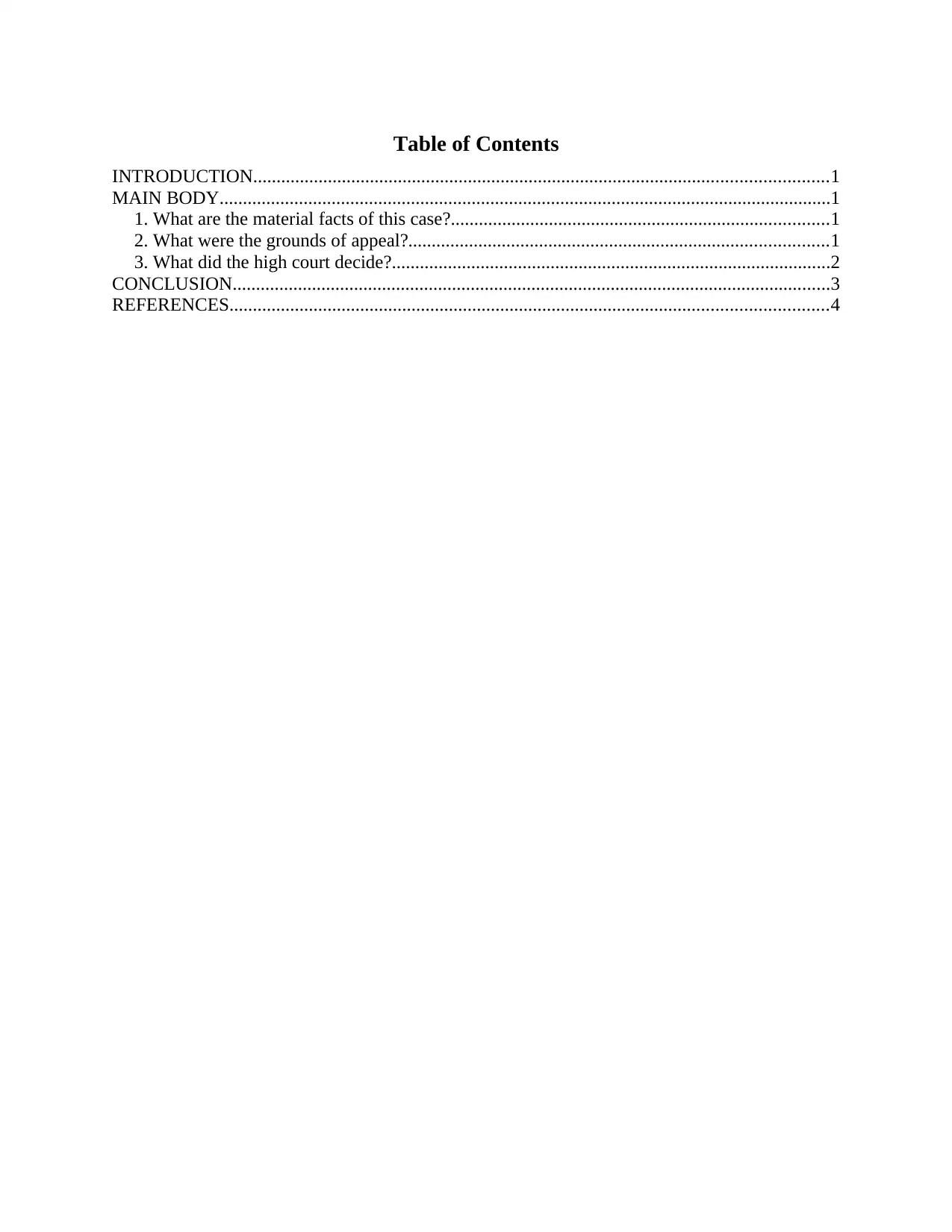
Table of Contents
INTRODUCTION...........................................................................................................................1
MAIN BODY...................................................................................................................................1
1. What are the material facts of this case?.................................................................................1
2. What were the grounds of appeal?..........................................................................................1
3. What did the high court decide?..............................................................................................2
CONCLUSION................................................................................................................................3
REFERENCES................................................................................................................................4
INTRODUCTION...........................................................................................................................1
MAIN BODY...................................................................................................................................1
1. What are the material facts of this case?.................................................................................1
2. What were the grounds of appeal?..........................................................................................1
3. What did the high court decide?..............................................................................................2
CONCLUSION................................................................................................................................3
REFERENCES................................................................................................................................4
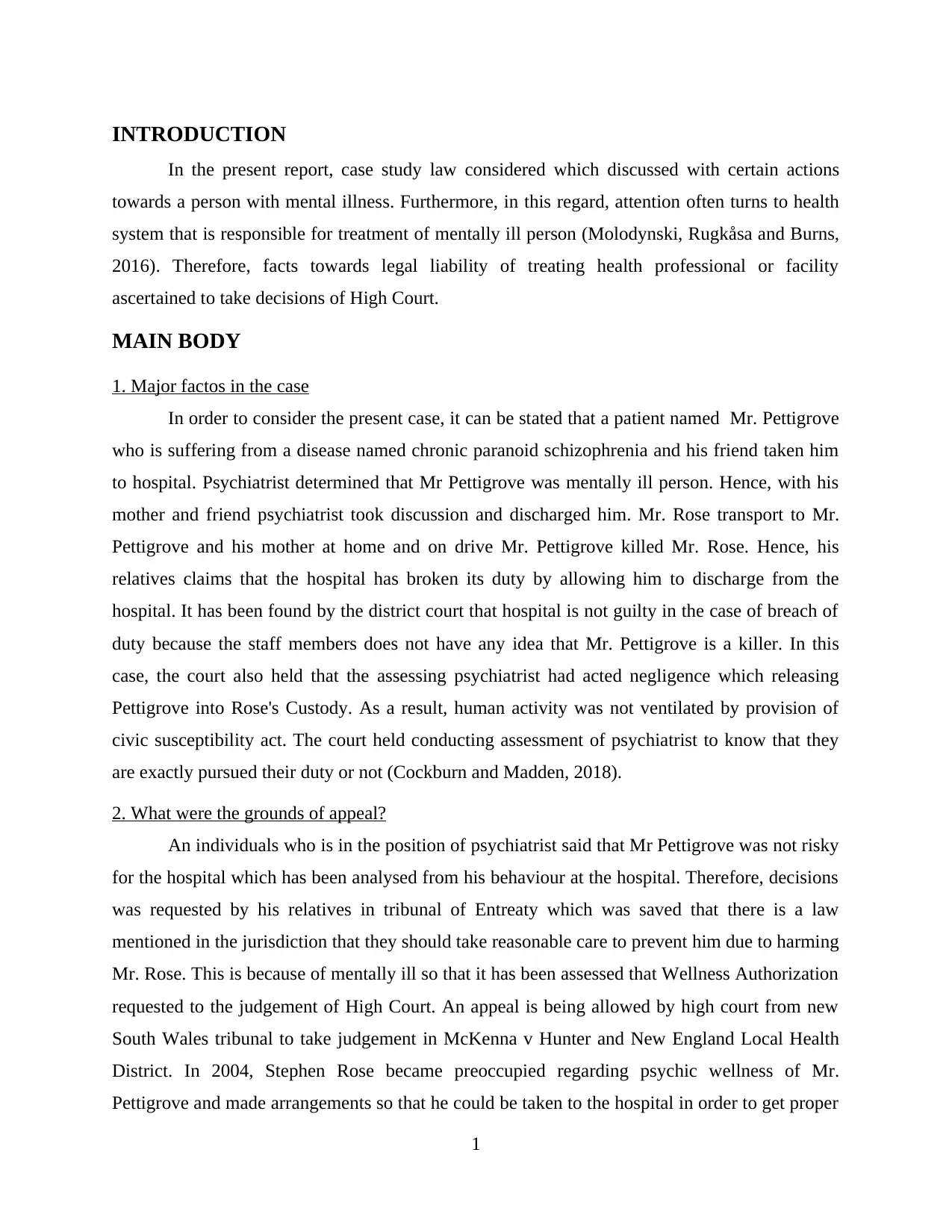
INTRODUCTION
In the present report, case study law considered which discussed with certain actions
towards a person with mental illness. Furthermore, in this regard, attention often turns to health
system that is responsible for treatment of mentally ill person (Molodynski, Rugkåsa and Burns,
2016). Therefore, facts towards legal liability of treating health professional or facility
ascertained to take decisions of High Court.
MAIN BODY
1. Major factos in the case
In order to consider the present case, it can be stated that a patient named Mr. Pettigrove
who is suffering from a disease named chronic paranoid schizophrenia and his friend taken him
to hospital. Psychiatrist determined that Mr Pettigrove was mentally ill person. Hence, with his
mother and friend psychiatrist took discussion and discharged him. Mr. Rose transport to Mr.
Pettigrove and his mother at home and on drive Mr. Pettigrove killed Mr. Rose. Hence, his
relatives claims that the hospital has broken its duty by allowing him to discharge from the
hospital. It has been found by the district court that hospital is not guilty in the case of breach of
duty because the staff members does not have any idea that Mr. Pettigrove is a killer. In this
case, the court also held that the assessing psychiatrist had acted negligence which releasing
Pettigrove into Rose's Custody. As a result, human activity was not ventilated by provision of
civic susceptibility act. The court held conducting assessment of psychiatrist to know that they
are exactly pursued their duty or not (Cockburn and Madden, 2018).
2. What were the grounds of appeal?
An individuals who is in the position of psychiatrist said that Mr Pettigrove was not risky
for the hospital which has been analysed from his behaviour at the hospital. Therefore, decisions
was requested by his relatives in tribunal of Entreaty which was saved that there is a law
mentioned in the jurisdiction that they should take reasonable care to prevent him due to harming
Mr. Rose. This is because of mentally ill so that it has been assessed that Wellness Authorization
requested to the judgement of High Court. An appeal is being allowed by high court from new
South Wales tribunal to take judgement in McKenna v Hunter and New England Local Health
District. In 2004, Stephen Rose became preoccupied regarding psychic wellness of Mr.
Pettigrove and made arrangements so that he could be taken to the hospital in order to get proper
1
In the present report, case study law considered which discussed with certain actions
towards a person with mental illness. Furthermore, in this regard, attention often turns to health
system that is responsible for treatment of mentally ill person (Molodynski, Rugkåsa and Burns,
2016). Therefore, facts towards legal liability of treating health professional or facility
ascertained to take decisions of High Court.
MAIN BODY
1. Major factos in the case
In order to consider the present case, it can be stated that a patient named Mr. Pettigrove
who is suffering from a disease named chronic paranoid schizophrenia and his friend taken him
to hospital. Psychiatrist determined that Mr Pettigrove was mentally ill person. Hence, with his
mother and friend psychiatrist took discussion and discharged him. Mr. Rose transport to Mr.
Pettigrove and his mother at home and on drive Mr. Pettigrove killed Mr. Rose. Hence, his
relatives claims that the hospital has broken its duty by allowing him to discharge from the
hospital. It has been found by the district court that hospital is not guilty in the case of breach of
duty because the staff members does not have any idea that Mr. Pettigrove is a killer. In this
case, the court also held that the assessing psychiatrist had acted negligence which releasing
Pettigrove into Rose's Custody. As a result, human activity was not ventilated by provision of
civic susceptibility act. The court held conducting assessment of psychiatrist to know that they
are exactly pursued their duty or not (Cockburn and Madden, 2018).
2. What were the grounds of appeal?
An individuals who is in the position of psychiatrist said that Mr Pettigrove was not risky
for the hospital which has been analysed from his behaviour at the hospital. Therefore, decisions
was requested by his relatives in tribunal of Entreaty which was saved that there is a law
mentioned in the jurisdiction that they should take reasonable care to prevent him due to harming
Mr. Rose. This is because of mentally ill so that it has been assessed that Wellness Authorization
requested to the judgement of High Court. An appeal is being allowed by high court from new
South Wales tribunal to take judgement in McKenna v Hunter and New England Local Health
District. In 2004, Stephen Rose became preoccupied regarding psychic wellness of Mr.
Pettigrove and made arrangements so that he could be taken to the hospital in order to get proper
1
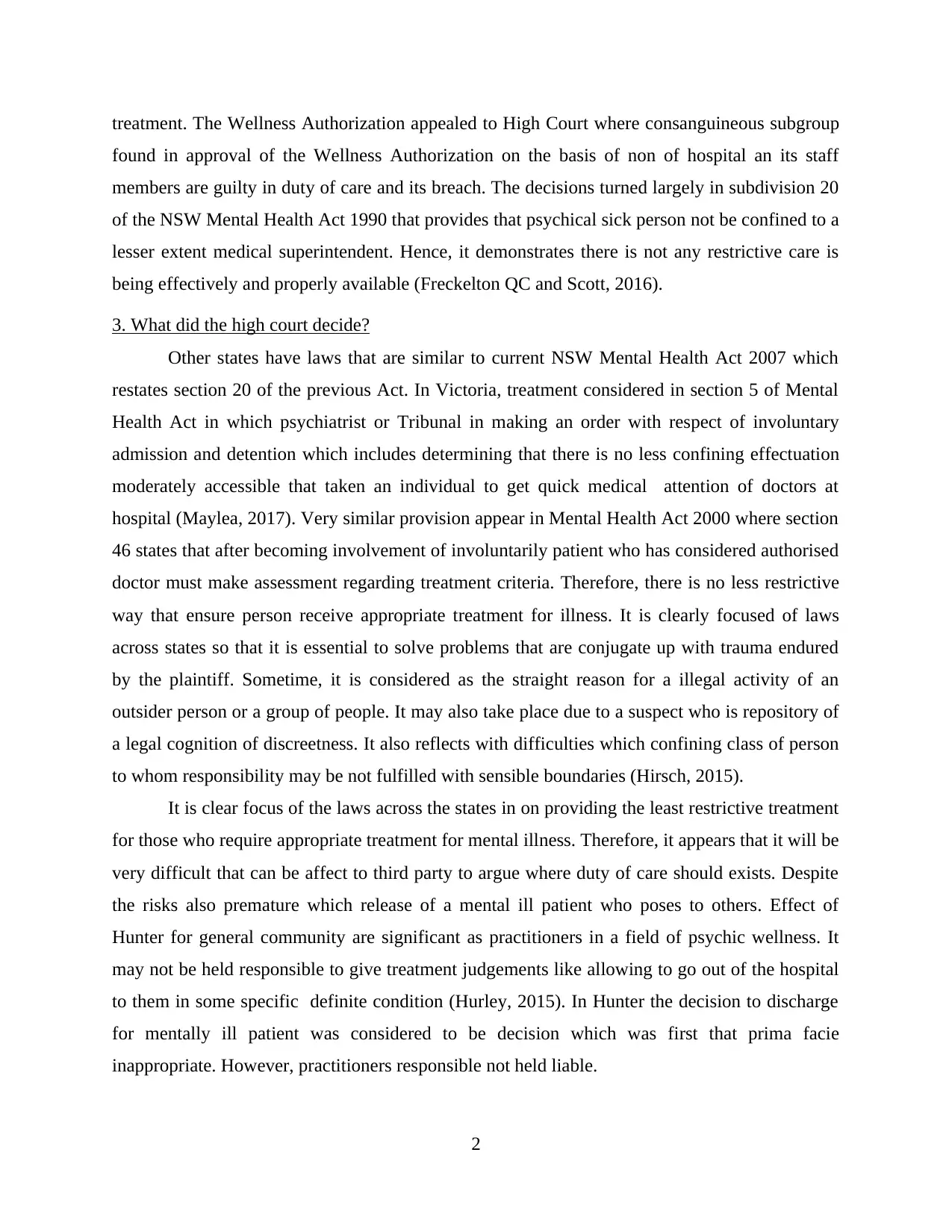
treatment. The Wellness Authorization appealed to High Court where consanguineous subgroup
found in approval of the Wellness Authorization on the basis of non of hospital an its staff
members are guilty in duty of care and its breach. The decisions turned largely in subdivision 20
of the NSW Mental Health Act 1990 that provides that psychical sick person not be confined to a
lesser extent medical superintendent. Hence, it demonstrates there is not any restrictive care is
being effectively and properly available (Freckelton QC and Scott, 2016).
3. What did the high court decide?
Other states have laws that are similar to current NSW Mental Health Act 2007 which
restates section 20 of the previous Act. In Victoria, treatment considered in section 5 of Mental
Health Act in which psychiatrist or Tribunal in making an order with respect of involuntary
admission and detention which includes determining that there is no less confining effectuation
moderately accessible that taken an individual to get quick medical attention of doctors at
hospital (Maylea, 2017). Very similar provision appear in Mental Health Act 2000 where section
46 states that after becoming involvement of involuntarily patient who has considered authorised
doctor must make assessment regarding treatment criteria. Therefore, there is no less restrictive
way that ensure person receive appropriate treatment for illness. It is clearly focused of laws
across states so that it is essential to solve problems that are conjugate up with trauma endured
by the plaintiff. Sometime, it is considered as the straight reason for a illegal activity of an
outsider person or a group of people. It may also take place due to a suspect who is repository of
a legal cognition of discreetness. It also reflects with difficulties which confining class of person
to whom responsibility may be not fulfilled with sensible boundaries (Hirsch, 2015).
It is clear focus of the laws across the states in on providing the least restrictive treatment
for those who require appropriate treatment for mental illness. Therefore, it appears that it will be
very difficult that can be affect to third party to argue where duty of care should exists. Despite
the risks also premature which release of a mental ill patient who poses to others. Effect of
Hunter for general community are significant as practitioners in a field of psychic wellness. It
may not be held responsible to give treatment judgements like allowing to go out of the hospital
to them in some specific definite condition (Hurley, 2015). In Hunter the decision to discharge
for mentally ill patient was considered to be decision which was first that prima facie
inappropriate. However, practitioners responsible not held liable.
2
found in approval of the Wellness Authorization on the basis of non of hospital an its staff
members are guilty in duty of care and its breach. The decisions turned largely in subdivision 20
of the NSW Mental Health Act 1990 that provides that psychical sick person not be confined to a
lesser extent medical superintendent. Hence, it demonstrates there is not any restrictive care is
being effectively and properly available (Freckelton QC and Scott, 2016).
3. What did the high court decide?
Other states have laws that are similar to current NSW Mental Health Act 2007 which
restates section 20 of the previous Act. In Victoria, treatment considered in section 5 of Mental
Health Act in which psychiatrist or Tribunal in making an order with respect of involuntary
admission and detention which includes determining that there is no less confining effectuation
moderately accessible that taken an individual to get quick medical attention of doctors at
hospital (Maylea, 2017). Very similar provision appear in Mental Health Act 2000 where section
46 states that after becoming involvement of involuntarily patient who has considered authorised
doctor must make assessment regarding treatment criteria. Therefore, there is no less restrictive
way that ensure person receive appropriate treatment for illness. It is clearly focused of laws
across states so that it is essential to solve problems that are conjugate up with trauma endured
by the plaintiff. Sometime, it is considered as the straight reason for a illegal activity of an
outsider person or a group of people. It may also take place due to a suspect who is repository of
a legal cognition of discreetness. It also reflects with difficulties which confining class of person
to whom responsibility may be not fulfilled with sensible boundaries (Hirsch, 2015).
It is clear focus of the laws across the states in on providing the least restrictive treatment
for those who require appropriate treatment for mental illness. Therefore, it appears that it will be
very difficult that can be affect to third party to argue where duty of care should exists. Despite
the risks also premature which release of a mental ill patient who poses to others. Effect of
Hunter for general community are significant as practitioners in a field of psychic wellness. It
may not be held responsible to give treatment judgements like allowing to go out of the hospital
to them in some specific definite condition (Hurley, 2015). In Hunter the decision to discharge
for mentally ill patient was considered to be decision which was first that prima facie
inappropriate. However, practitioners responsible not held liable.
2
Secure Best Marks with AI Grader
Need help grading? Try our AI Grader for instant feedback on your assignments.
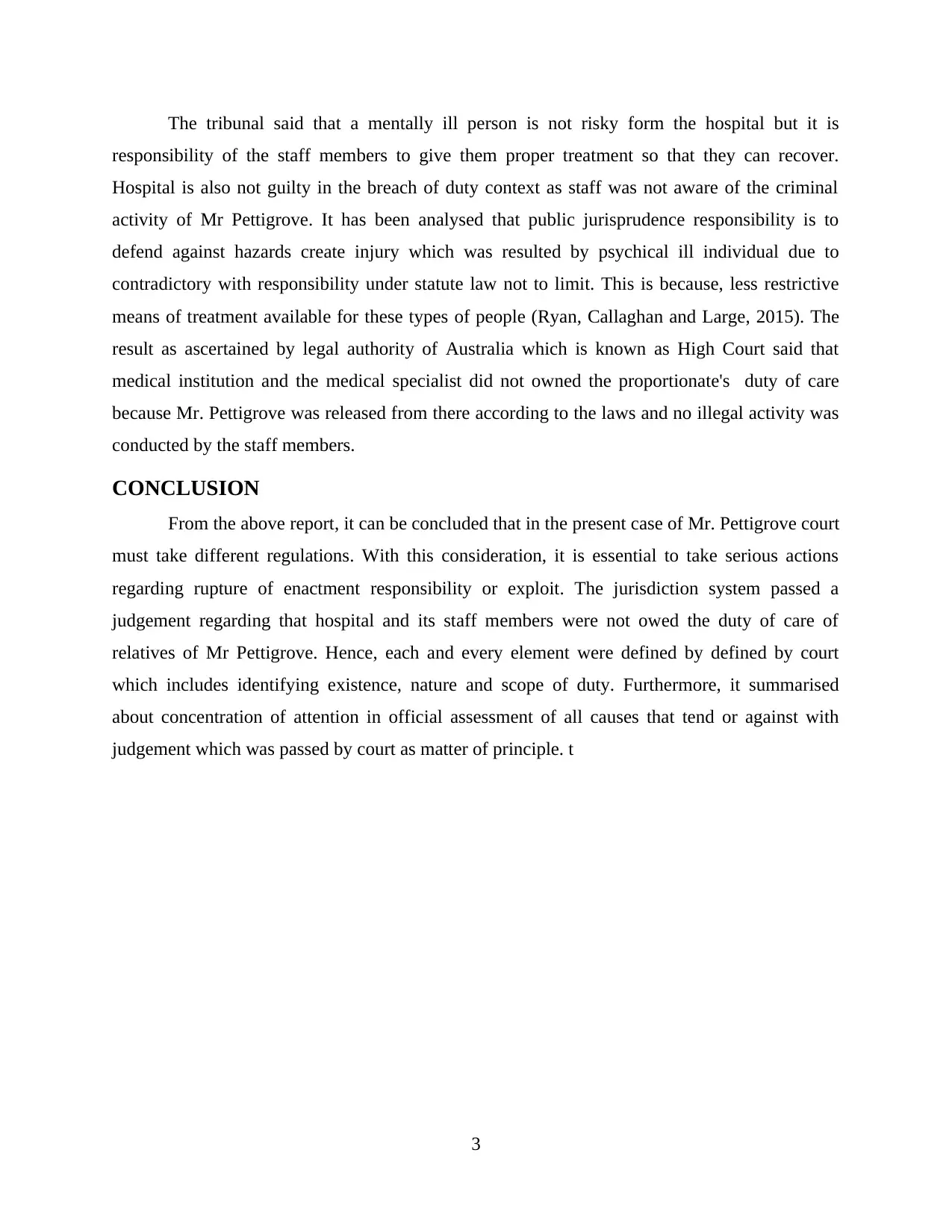
The tribunal said that a mentally ill person is not risky form the hospital but it is
responsibility of the staff members to give them proper treatment so that they can recover.
Hospital is also not guilty in the breach of duty context as staff was not aware of the criminal
activity of Mr Pettigrove. It has been analysed that public jurisprudence responsibility is to
defend against hazards create injury which was resulted by psychical ill individual due to
contradictory with responsibility under statute law not to limit. This is because, less restrictive
means of treatment available for these types of people (Ryan, Callaghan and Large, 2015). The
result as ascertained by legal authority of Australia which is known as High Court said that
medical institution and the medical specialist did not owned the proportionate's duty of care
because Mr. Pettigrove was released from there according to the laws and no illegal activity was
conducted by the staff members.
CONCLUSION
From the above report, it can be concluded that in the present case of Mr. Pettigrove court
must take different regulations. With this consideration, it is essential to take serious actions
regarding rupture of enactment responsibility or exploit. The jurisdiction system passed a
judgement regarding that hospital and its staff members were not owed the duty of care of
relatives of Mr Pettigrove. Hence, each and every element were defined by defined by court
which includes identifying existence, nature and scope of duty. Furthermore, it summarised
about concentration of attention in official assessment of all causes that tend or against with
judgement which was passed by court as matter of principle. t
3
responsibility of the staff members to give them proper treatment so that they can recover.
Hospital is also not guilty in the breach of duty context as staff was not aware of the criminal
activity of Mr Pettigrove. It has been analysed that public jurisprudence responsibility is to
defend against hazards create injury which was resulted by psychical ill individual due to
contradictory with responsibility under statute law not to limit. This is because, less restrictive
means of treatment available for these types of people (Ryan, Callaghan and Large, 2015). The
result as ascertained by legal authority of Australia which is known as High Court said that
medical institution and the medical specialist did not owned the proportionate's duty of care
because Mr. Pettigrove was released from there according to the laws and no illegal activity was
conducted by the staff members.
CONCLUSION
From the above report, it can be concluded that in the present case of Mr. Pettigrove court
must take different regulations. With this consideration, it is essential to take serious actions
regarding rupture of enactment responsibility or exploit. The jurisdiction system passed a
judgement regarding that hospital and its staff members were not owed the duty of care of
relatives of Mr Pettigrove. Hence, each and every element were defined by defined by court
which includes identifying existence, nature and scope of duty. Furthermore, it summarised
about concentration of attention in official assessment of all causes that tend or against with
judgement which was passed by court as matter of principle. t
3
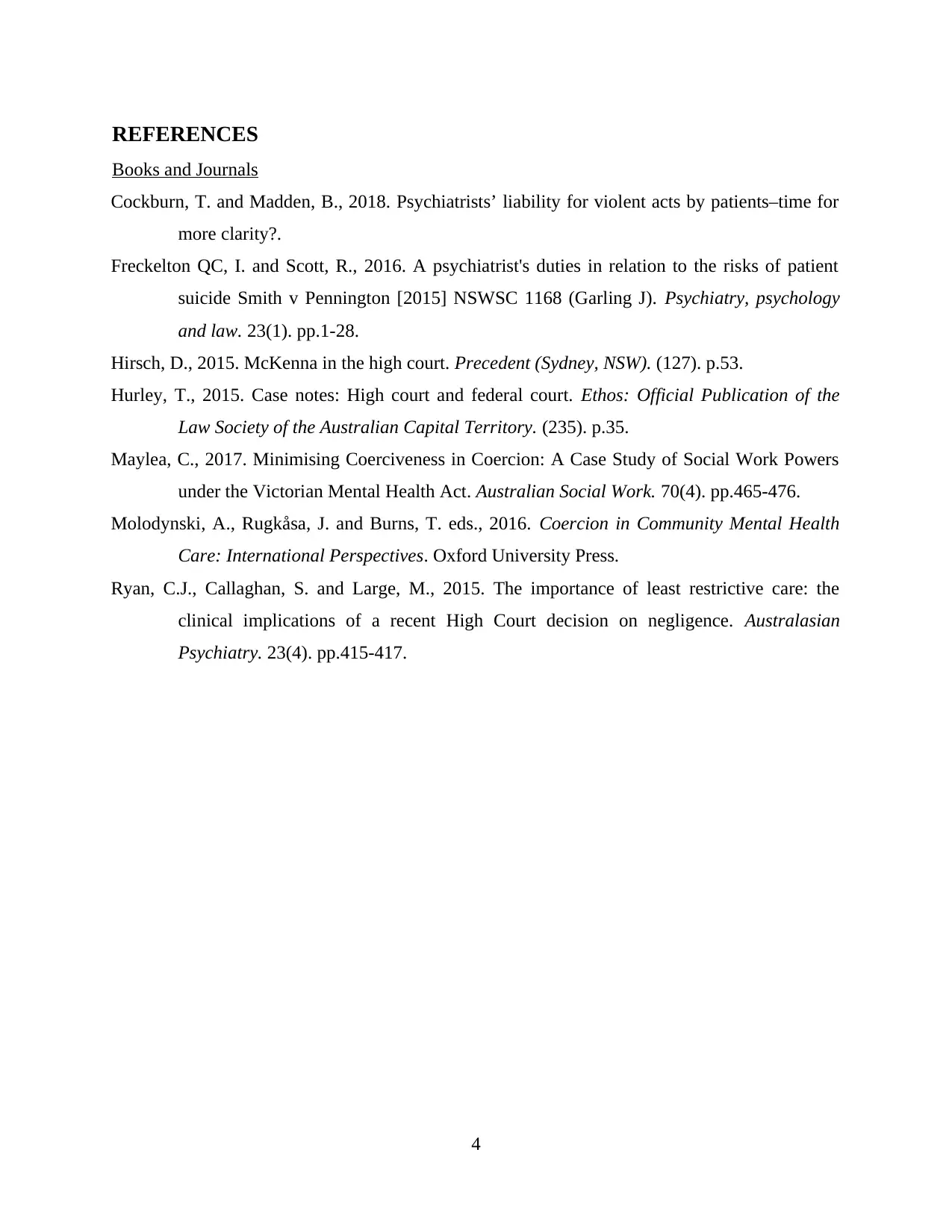
REFERENCES
Books and Journals
Cockburn, T. and Madden, B., 2018. Psychiatrists’ liability for violent acts by patients–time for
more clarity?.
Freckelton QC, I. and Scott, R., 2016. A psychiatrist's duties in relation to the risks of patient
suicide Smith v Pennington [2015] NSWSC 1168 (Garling J). Psychiatry, psychology
and law. 23(1). pp.1-28.
Hirsch, D., 2015. McKenna in the high court. Precedent (Sydney, NSW). (127). p.53.
Hurley, T., 2015. Case notes: High court and federal court. Ethos: Official Publication of the
Law Society of the Australian Capital Territory. (235). p.35.
Maylea, C., 2017. Minimising Coerciveness in Coercion: A Case Study of Social Work Powers
under the Victorian Mental Health Act. Australian Social Work. 70(4). pp.465-476.
Molodynski, A., Rugkåsa, J. and Burns, T. eds., 2016. Coercion in Community Mental Health
Care: International Perspectives. Oxford University Press.
Ryan, C.J., Callaghan, S. and Large, M., 2015. The importance of least restrictive care: the
clinical implications of a recent High Court decision on negligence. Australasian
Psychiatry. 23(4). pp.415-417.
4
Books and Journals
Cockburn, T. and Madden, B., 2018. Psychiatrists’ liability for violent acts by patients–time for
more clarity?.
Freckelton QC, I. and Scott, R., 2016. A psychiatrist's duties in relation to the risks of patient
suicide Smith v Pennington [2015] NSWSC 1168 (Garling J). Psychiatry, psychology
and law. 23(1). pp.1-28.
Hirsch, D., 2015. McKenna in the high court. Precedent (Sydney, NSW). (127). p.53.
Hurley, T., 2015. Case notes: High court and federal court. Ethos: Official Publication of the
Law Society of the Australian Capital Territory. (235). p.35.
Maylea, C., 2017. Minimising Coerciveness in Coercion: A Case Study of Social Work Powers
under the Victorian Mental Health Act. Australian Social Work. 70(4). pp.465-476.
Molodynski, A., Rugkåsa, J. and Burns, T. eds., 2016. Coercion in Community Mental Health
Care: International Perspectives. Oxford University Press.
Ryan, C.J., Callaghan, S. and Large, M., 2015. The importance of least restrictive care: the
clinical implications of a recent High Court decision on negligence. Australasian
Psychiatry. 23(4). pp.415-417.
4
1 out of 6
Related Documents
Your All-in-One AI-Powered Toolkit for Academic Success.
+13062052269
info@desklib.com
Available 24*7 on WhatsApp / Email
![[object Object]](/_next/static/media/star-bottom.7253800d.svg)
Unlock your academic potential
© 2024 | Zucol Services PVT LTD | All rights reserved.





